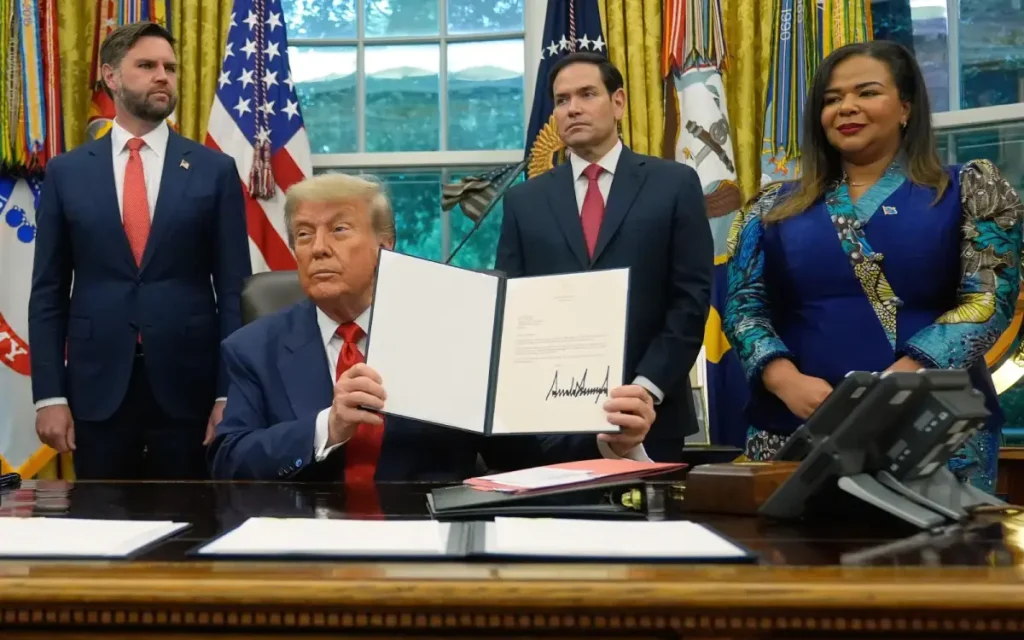Trump sees mineral opportunity in DR Congo peace deal

President Trump is reportedly preparing a bold, yet potentially problematic, peace deal to definitively end the long-standing conflict in eastern Democratic Republic of Congo according to BBC News on July 28th.
The conflict that has plagued the mineral-rich region of Eastern DR Congo has also involved neighbouring Rwanda, and President Trump is expected to host the leaders of both countries – Felix Tshisekedi and Paul Kagame – to confirm a peace agreement after representatives from the two nations signed an initial peace deal on June 27th.
The President’s mediation comes as no surprise considering the wealth of minerals DR Congo possesses, resources that President Trump views as pivotal to the US strengthening their AI advancement in the face of competition from China, who have their own resources deal with DR Congo.
It is not the first time the US President has used a country’s national resources to ensure security-related agreements. It was an integral, and sensitive, element of the deal Trump agreed with Ukraine’s President Zelenskyy.
Executive Director of the US-based World Peace Foundation Prof Alex De Waal remarked on this pattern, claiming Trump has moulded a “new model of peace making, combining populist performance with commercial deal-making”.
He further claimed that this deal will boost US investment, considering that US companies would previously avoid investing in the region due to a reluctance of dealing in “blood minerals” – minerals being used to fund rebellious conflicts, but the pragmatism of Trump’s peace-making strategy could shift this approach.
This transactional approach to geo-political security could also occur in other conflict-stricken regions such as Sudan, where the US along with other gulf countries could restart mediation efforts.
However, the Trump administration’s emphasis on mineral investment to secure peace risks undermining the sovereignty of nations like Ukraine and DR Congo according to Prof Hanri Mostert, an academic in mineral law at the University of Cape Town.
DR Congo could be trapped into deals for years in exchange for weak and vague security guarantees, she said, citing the example of Angola’s oil being exploited through China’s extensive Belt and Road initiative in exchange for rail infrastructure.
DR Congo has an estimated $24trn in mineral reserves according to the US State Department, with their reserves encompassing cobalt, copper, lithium and manganese, which are needed to make electrical components used in computers, electrical vehicles and military hardware.
This has led the likes of Prof Mostert to question “what is the price for peace?”. For DR Congo it looks like the exchange of critical minerals is crucial for US-led mediation.
Rwanda has further complicated this process, with the M23 rebel group seizing huge swathes of eastern DR Congo and smuggling minerals across the border to Rwanda, UN experts said in a report. The President of Rwanda Paul Kagame denies accusations it backs the M23, despite evidence that they have thousands of troops in DR Congo.
To address this critical issue of resource-smuggling, deal brokered by the US administration provides for a “regional economic integration framework” between the two nations to eradicate illicit economic pathways. Reportedly, the US and Qatar have been mediating the breakthrough deal after failed African-led mediation talks, with the economic powers wanting to restart investment in the region.
On August 18th, the signing of a comprehensive peace agreement between the M23 and the DR Congo government is expected to take place, something that International Crisis Group think-tank analyst Onesphore Sematumba attributes to Trump’s presidency.
Since Trump’s election, the US along with Qatar have been getting deals done in “record time” after a period when interventions had failed to get a “single document signed” according to Sematumba.
Now Trump has established his preferred model, it is unlikely he will change it. What he will be hoping is his model keeps the peace long enough for his treasury department to feel the benefits.
BBC News, Maghrebi.org
Want to chase the pulse of North Africa?
Subscribe to receive our FREE weekly PDF magazine











